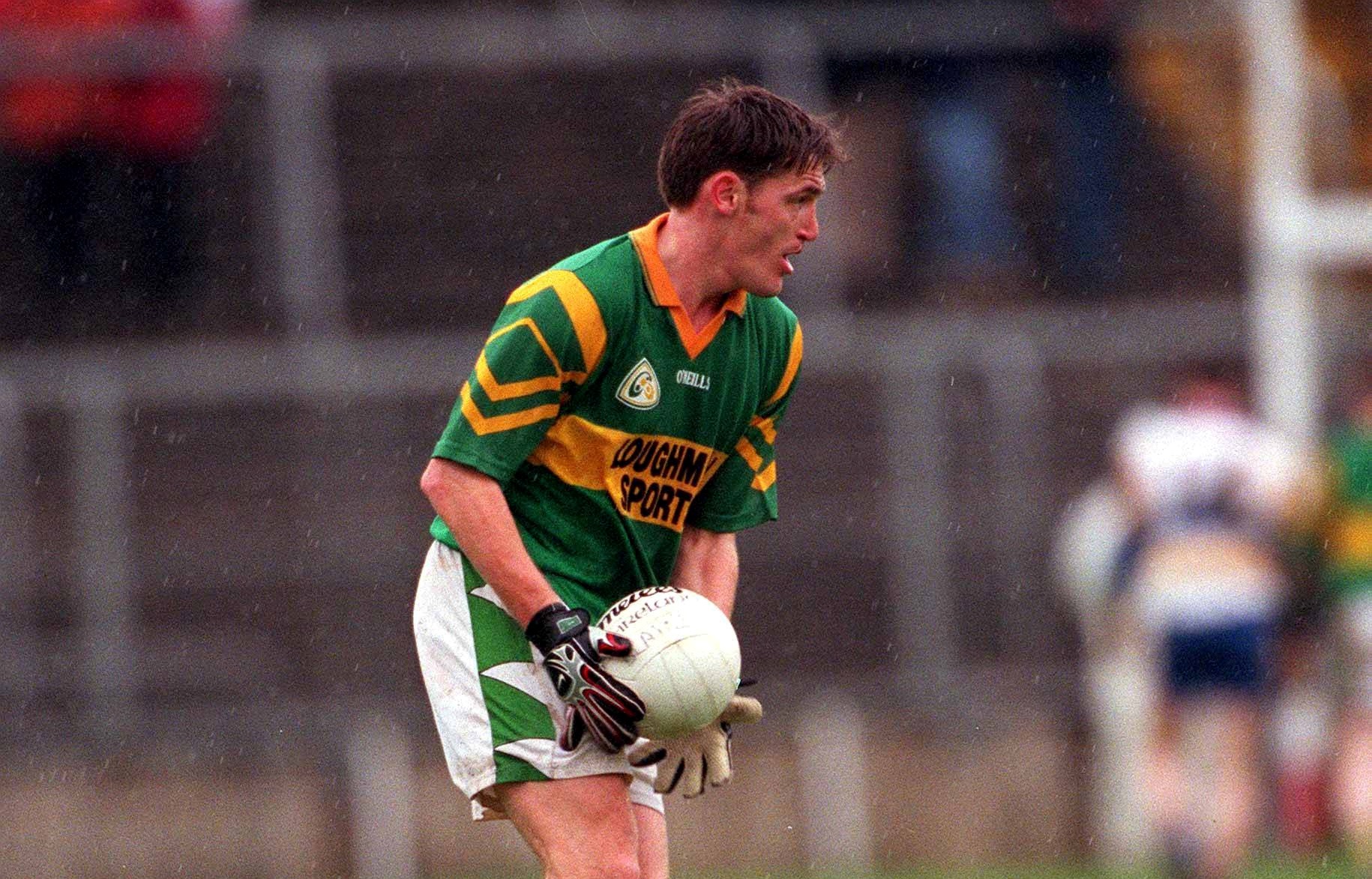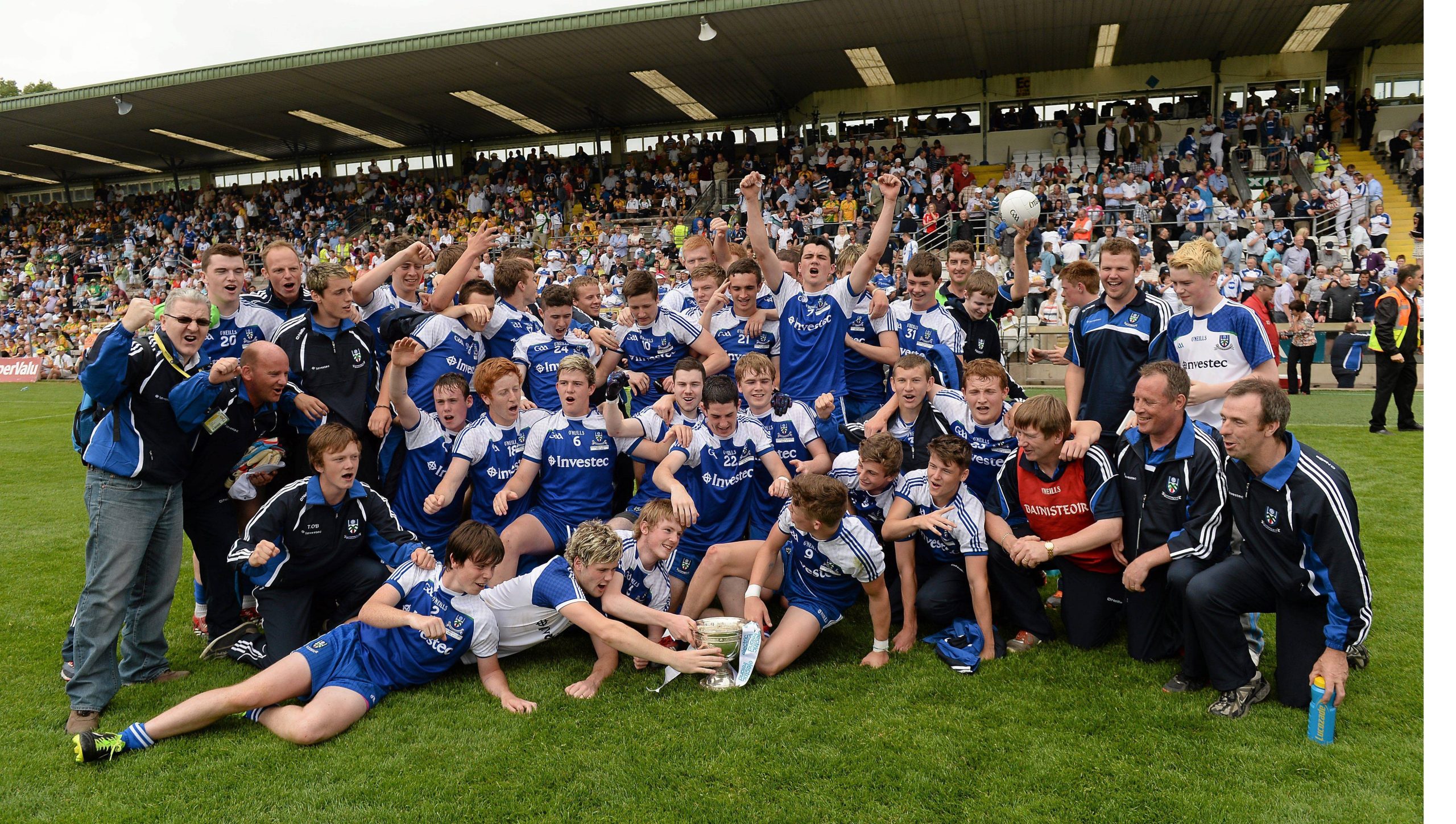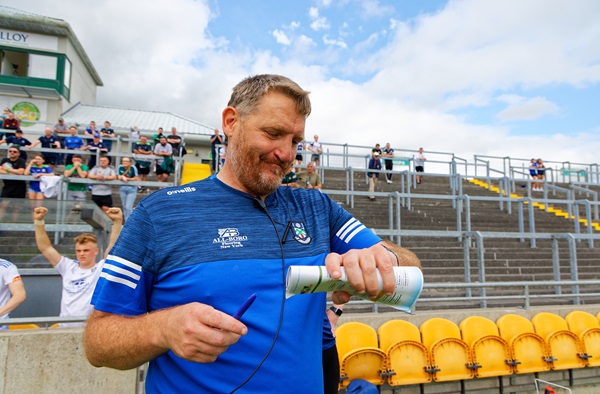Paul O’Connor had a passion for coaching and decided to make it his career. The Castleblayney man has been at the heart on Monaghan’s upward football trend. He spoke with Michael McMullan
MENTION the development of Monaghan football and Paul O’Connor’s name always comes up. There won’t be many who pull a Farney jersey over their head without having had a steer from him somewhere along the production line.
You don’t need to talk to him long to realise why. Games development manager. Coach. Monaghan fanatic. Take your pick but he wears all three hats. They all fit perfectly.
A six-time championship winner with Castleblayney Faughs, he is back alongside one of idols Eamon McEneaney trying to mould their seniors.
Married and living in nearby Doohamlet, when nosing the car out of the driveway, one way is to the local pitch in the village but Paul’s club will always be ‘Blayney.
His repeated use of the word ‘grá’ refers to coaching, to ‘Blayney and to Monaghan.
In his early 20s, the lightbulb went off in his head. Coaching floated his boat. Having played football, hurling and basketball, there was a love of sport.
At school in Our Lady’s Castleblayney sport pulled at his heart strings more than the books did. Deeper study would wait.
Like McEneaney did with football, Gerry Smith inspired him in basketball. He owes both men for planting the seed.
Growing up, O’Connor mixed playing with looking after underage teams in ‘Blayney and coordinating the summer camps.
The next step was making sport his livelihood. A qualification in Dublin’s Dundrum College took him down the sports development route via Liverpool John Moores’ University.
“I dedicated myself to studying and getting qualified and doing a couple of years in Liverpool. WhenI came back home, I was a full-time coach in Dublin as a GPO at Cuala for a couple of years,” O’Connor said of the early days.
He poured everything he had into it, both the big ball and the wee ball. Six days a week he’d be coaching at some level. A young Con O’Callaghan would’ve come through the ranks. The Treacys who hurled with the Dubs as well. O’Connor was living the dream. This was it.
By his mid-20s, he began to weigh up playing versus going all in with a sporting career.
“I would have finished playing fairly young, in or around the 25 or 26 mark,” he said.
“I sort of dabbled wee bits and pieces after but once I was working in Dublin and as a full-time coach there, I really threw myself into it.”
Hindsight suggests he should’ve kept pulling on the boots but coaching was full on.

CLUB TIME…Paul O’Connor is the holder of six Monaghan Senior Championship medals from his days playing with Castleblayney
By 2007, he was alongside manager Bernie Murray with the Monaghan minors. After being on the wrong end of a defeat to Derry where they only scored a point, they bounced back 12 months later.
A team including current minor manager Dermot Malone, Colin Walshe, Fintan Kelly, Kieran Hughes, Christopher McGuinness and Kieran Duffy felled the Oaks and pushed eventual All-Ireland champions Tyrone all the way on Ulster final day.
It was only the start of O’Connor’s imprint that lasts to this very day.
***
With the qualifications to match his grá for coaching, O’Connor was back at Monaghan’s coal face. It was time to roll up the sleeves.
At a time when Tyrone were the benchmark in Ulster, Monaghan looked inwards.
It was time for academies and development squads. Schools and clubs were brought under one umbrella. It was all about one thing – Monaghan.
“To invest in our youth and our younger players, that very much was the mantra when I would have come back in first,” said O’Connor, also highlighting the input of the coaching committee under Paul Curran’s watch.
Another important ingredient was a well-structured programme of games. Players don’t develop without being tested.
“There’s another thing and I know this might sound very simple but the one thing about our county, the kids want to play for our county and they’re encouraged to play for their county,” O’Connor added.
“Once you have that, you’re able to work with people to make sure that the players are always put first and so that was a big focus.”
Full-time staff were added to help in the delivery of coaching and coaching education. It also coincided with Monaghan’s Centre of Excellence in Cloughan.
Having their own base brought self-sufficiency with pitches, a gym and meeting facilities. Players from the academies were rubbing shoulders with the county minor, u-21 and senior players.
“Around that time, Seamus McEnaney would have been involved with our senior team and he was creating a sort of an aura around our players,” O’Connor explains.
“He was trying to get the best players out to play and everybody was buying into playing for our county and that rubbed off on us.
“I think we might have won a Division Three title in around then but we were certainly competing at a very high level and maybe getting to Ulster finals.
“We weren’t getting over the line but we were competing at a high level and doing well in the National Leagues.”
It all fed into the overall Monaghan picture O’Connor and the county were trying to paint.
Behind it all was a genuine love for Monaghan and an unwritten commandment of fighting for every ball and chasing any play – all the way to the final whistle.
There were hurdles. There always is. Progress never follows a straight line. In the early days, there were chastening defeats before the standards began to rise.
Schools were encouraged and helped to compete at the highest possible level.
Players were taken out of their comfort zone with the view to improvement.
It fed into Monaghan underage competing with and beating counties they’d been used to looking up to. Add in how they thrived on their underdog status.
“We’d actually get our backs up, backs to the wall and weren’t there to be the poor mouth,” O’Connor added.
“We’ll make use of what we have and we’re very good at that. If you are going to play Monaghan you know you’re going to be in for a good tough hard battle.
“We relish that, that’s our DNA. We go out and we work hard; we compete for every ball and we fight for every ball. That’s who we are.
“Once you get the basis of that, every time you go out and once you can get that to a very high level then we have the quality. We’ll always be very hard to beat and that’s stood the test of time.”
***
The wheels continue to turn. While the fixture programme is well put together there is still a need for clubs and schools to sing off the same page.
With u-16 and minor competitions overlapping into September, give and take is an important currency. O’Connor listed virtually the name of every teacher involved in GAA with the county. From the established St Macartan’s College to the smaller seats of learning, they have Monaghan men driving GAA. That’s priceless.
“They’re all good fellas, they’re all invested in promoting and developing the game,” he said.
“We would try to have a good strong relationship with those people. They do untold work for us in terms of developing and promoting a game and particularly those players to play at a high level.
“They’re preparing their teams to go out and play at a very high level at schools’ football because once upon a time we wouldn’t compete with Derry schools or Tyrone schools.
“Now we have three teams in MacRory (Cup) and we’ve only had that in the last couple of years. We’re competing really well at whatever level the schools in Monaghan are at.”
O’Connor puts it down to the commitment of teachers and school leaders above that.
“They see the benefit of promoting and developing our game,” O’Connor continued. “They see that we’re a mad footballing county and we want to do well so they’re buying into that.”
It works both ways. Sport will attract numbers and, so, the cycle continues.
***
Dermot Malone was on the county minor team that O’Connor coached when he returned to Monaghan.
A generation apart, they led the Farney minors to last year’s Ulster and All-Ireland finals. Derry took the silverware but it was progress.
Looking back at the 2013 winning minor team, players like Conor McCarthy and Ryan McAnespie, Dessie Ward, Micheal McCarville and Kevin Loughran were part of the winning team.
There was the 2018 Ulster minor group, captained by the late Brendan Óg Duffy, that excelled under manager McEnaney.
Mark Counihan took the baton in 2019 with another winning team with Monaghan running eventual All-Ireland champions Derry close the following season.
“Bar one player, everybody else in the (2018) squad came through the development squads,” O’Connor added.
“’Banty’ (McEnaney) was telling me that and it shows what we’re doing and we’re on the right road here and going well.
“All of them would have been built in around that time on the u-16 Buncrana Cup. We would have competed really well in this.
“When I initially come into my role, we struggled badly in that competition. Then, over a period of time, we started to get out of a group and get to the semi-finals up in Donegal.
“In the semi-final, we’d get beat or well beat then we progressed to getting to the finals and starting to win and we won two or three in a row.”
That’s the signpost Monaghan had been looking for. They were no longer looking up the successful counties in Ulster. Instead, they’d be rubbing shoulders with regularity. With that came confidence their planning was on the money.

CELEBRATION TIME…The Monaghan minors celebrate their 2013 Ulster minor title at Clones on the day the senior took home the Anglo Celt Cup
“We haven’t had the success of u-20s level,” he added. “We’ve been unfortunate a couple of times and maybe things didn’t go our way.
“It’s (the underage progress) stemmed from that good development squad structure, our schools competing really well.”
Another factor has been the county’s presence in the top flight of the National League. Until this season’s relegation, only Kerry were in Division One longer.
“That’s unbelievable,” O’Connor said of the knock-on effect. “It created a bit of a buzz around football.
“We were always maybe a live (TV) game, on the back pages and on The Sunday Game. They (Monaghan seniors) were always on the telly.
“That, tied into what we were doing, once you’re going well across a number of fronts, then it’s easy to get people to buy in.”
When Monaghan begin life in Division Two next winter, it, according to O’Connor, will be a change but not the end. Their structures have been built to last.
“We still have plenty of players coming through and the conveyor belt is still good,” he said before continuing to reevaluate.
“We need to reflect and see can we do things a wee bit better and we’ll do that and we are doing that.
“We still have the nucleus of a good group of players there at senior level. It was obviously tough on the management team,” he added, pointing to injuries, Rory Beggan’s NFL trials and Karl Gallagher’s switch to the AFL.
“A lot of things didn’t go our way but the foundations have been laid. Younger players who’ve got a lot of game time. I feel that Monaghan’s in a good place
“For anybody looking in, it’s certainly a good place to be coming to. With the type of player that we have, they’re all very committed, all very keen, a good group of fellas.
“They’ll leave no stone unturned to prepare themselves as best they can. It has always been the case with Monaghan and it’s the same with the lads now.”
It will be under a new watch after Vinny Corey’s decision to step down. Like Tommy Freeman and Paul Finlay have done on these pages, O’Connor pays tribute to the input of Corey.
“What he’s done for Monaghan both as a player as a manager can’t be questioned,” he said, adding his tribute for Corey’s backroom team.
“It’s a huge commitment being involved with county teams. You don’t know people’s background, work, family life or whatever when people step away.
“I still think Monaghan’s in a very good position. Yes, there’s going to be a change in the guard over the next while and it will be challenging.
“On the other side, we have a strong group of players there that’s well fit to compete in Division Two and get us back up and over a period of time competing for silverware again.
“That’s the way life goes. You can’t bury your hand in the sand. You got to roll your sleeves up so we can work a bit smarter and away we go again.”
Monaghan have a lot to be thankful to Paul O’Connor for. The proof of the pudding is in the eating. There has been silverware and there has been progress and there has been that same deep pride for Monaghan.
The man himself, he can’t put his finger on the number one reason for the county’s progress.
It’s a combination of everything, calmly rolled out over a Friday morning chat.
In summary, the structures at all levels are key. The number of children playing and dreaming of pulling on a Monaghan jersey is another key one.
That’s why school is important and how clubs link in.
Eventually O’Connor rests on his concluding statement. It’s all about the people.
“That might sound very simple and maybe a bit maybe blasé but that is so true,” he concludes.
“It’s having good people involved, good capable people involved across numerous spectrums – clubs, school and at county level.
“In our county, they love the game and they want to play. Once you’ve got that and have good people, then you are always going to be there or thereabouts.”
One of those people is Paul O’Connor. That’s why Monaghan people speak highly of him.
A ‘Blayney man, a Farney man who knows the meaning of grá and identity.
Receive quality journalism wherever you are, on any device. Keep up to date from the comfort of your own home with a digital subscription.
Any time | Any place | Anywhere












